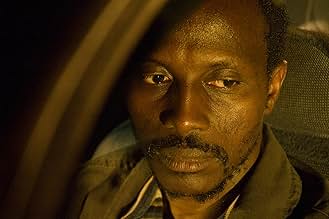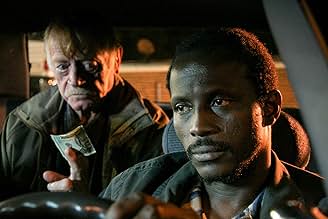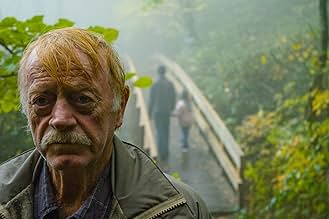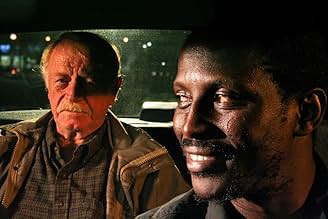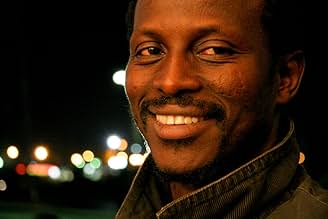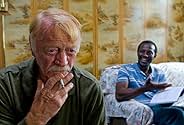VALUTAZIONE IMDb
7,3/10
6227
LA TUA VALUTAZIONE
Due uomini formano un'amicizia improbabile che cambierà per sempre le loro vite.Due uomini formano un'amicizia improbabile che cambierà per sempre le loro vite.Due uomini formano un'amicizia improbabile che cambierà per sempre le loro vite.
- Regia
- Sceneggiatura
- Star
- Premi
- 3 vittorie e 9 candidature totali
Souleymane Sy Savane
- Solo
- (as Souléymane Sy Savané)
Recensioni in evidenza
Some people are so attached to their story that they manage to continually sabotage their aliveness and their capacity for love. Even when someone reaches out to them and challenges the skewed way in which they have constructed their world, they effectively shut them out. Ramin Bahrani's third feature, Goodbye Solo, is about William, a man clinging to his victimization act so tightly that he turns away from the only person who cares, a high-energy cab driver from Senegal who is willing to go the extra mile to tear down the wall that separates William from his fellow human beings.
Similar in narrative to Abbas Kiarostami's masterpiece A Taste of Cherry, Solo (Souléymane Sy Savané) a Senegalese immigrant living in Winston Salem, North Carolina (where the director grew up) picks up a 72-year-old Caucasian passenger named William, played by Red West, a former Marine, stuntman, boxer, and bodyguard for Elvis Presley, who Solo refers to as "Big Dog". We learn next to nothing about the cantankerous old man. He refuses to engage the gregarious Solo in conversation except to offer him $1000 to drive him to Blowing Rock, a windy mountainous area, in two weeks with the depressing implication that it will be the end of the road for him, both literally and figuratively.
Similar in theme to Mike Leigh's Poppy in Happy-Go-Lucky, Solo does not back off from his selfless display of good humor even when confronted by William's cold rejection. He maintains his optimism when studying for an exam to become a flight attendant. Solo knows where to find drugs or a sexual partner but there is no hint that he ever partakes. Eventually some of his positive attitude begins to break down barriers. William helps Solo in his studying, and allows him to move into his motel room when he runs into marital difficulties with his pregnant Mexican wife (Carmen Leyva). They go out drinking together, Solo introduces him to his stepdaughter Alex (Diana Franco Galindo), does his laundry for him, checks his medicine stash to see if he has some hidden terminal illness, and even searches the motel room to try and find a picture of a relative he could contact.
Gradually the two men appear to draw closer, at times showing moments of connection, and then falling back into uncertainty and rejection. Solo still searches for the clue that can prevent the inevitable, even going so far as to find out why William continually attends a local movie theater and engages in conversation with the young cashier at the box office. Bahrani's Solo is not a stereotype of the cool hip black man out to rescue the forlorn white man from himself. Solo is a multi-faceted human being with his own set of problems who is always depicted with respect. The finale, shot in the beautiful North Carolina Mountains in October, captures the stirring symphony of autumn color, and the long look that William and Solo give each other before they part is the essence of compassion, given freely with an open heart - even to the point when no payback is achieved or expected.
Similar in narrative to Abbas Kiarostami's masterpiece A Taste of Cherry, Solo (Souléymane Sy Savané) a Senegalese immigrant living in Winston Salem, North Carolina (where the director grew up) picks up a 72-year-old Caucasian passenger named William, played by Red West, a former Marine, stuntman, boxer, and bodyguard for Elvis Presley, who Solo refers to as "Big Dog". We learn next to nothing about the cantankerous old man. He refuses to engage the gregarious Solo in conversation except to offer him $1000 to drive him to Blowing Rock, a windy mountainous area, in two weeks with the depressing implication that it will be the end of the road for him, both literally and figuratively.
Similar in theme to Mike Leigh's Poppy in Happy-Go-Lucky, Solo does not back off from his selfless display of good humor even when confronted by William's cold rejection. He maintains his optimism when studying for an exam to become a flight attendant. Solo knows where to find drugs or a sexual partner but there is no hint that he ever partakes. Eventually some of his positive attitude begins to break down barriers. William helps Solo in his studying, and allows him to move into his motel room when he runs into marital difficulties with his pregnant Mexican wife (Carmen Leyva). They go out drinking together, Solo introduces him to his stepdaughter Alex (Diana Franco Galindo), does his laundry for him, checks his medicine stash to see if he has some hidden terminal illness, and even searches the motel room to try and find a picture of a relative he could contact.
Gradually the two men appear to draw closer, at times showing moments of connection, and then falling back into uncertainty and rejection. Solo still searches for the clue that can prevent the inevitable, even going so far as to find out why William continually attends a local movie theater and engages in conversation with the young cashier at the box office. Bahrani's Solo is not a stereotype of the cool hip black man out to rescue the forlorn white man from himself. Solo is a multi-faceted human being with his own set of problems who is always depicted with respect. The finale, shot in the beautiful North Carolina Mountains in October, captures the stirring symphony of autumn color, and the long look that William and Solo give each other before they part is the essence of compassion, given freely with an open heart - even to the point when no payback is achieved or expected.
Two men are in a taxicab. The passenger is a scowling, angry, misanthropic old man. The cabbie is a smiling, exuberant African immigrant. In a few lines of dialogue we learn that the misanthrope wants to be taken to Blowing Rock, North Carolina on the 20th of the month. "Why?" jokes the cabbie, "You gonna jump off?" No reply. The cabbie's glowing smile disappears.
The poetry of that opening scene is only rivaled by its ability to set a powerful air of suspense that carries through the entire 91-minute film all the way until the last minute. And even though there aren't any flashy car chases, shootouts, steamy sex scenes or fantastical plot twists, "Goodbye Solo" grabs your full attention from start to finish.
The theme, beautifully set in the opening scene & fleshed out as the story progresses, centers around the duality of the American dream and the American nightmare. The cabbie, relatively new to the USA, loves life and the endless opportunities life presents. He has a job and a family, neither of which are perfect, but they make him happy nonetheless. And he genuinely loves people. The old man is bitter, alone, presumably due to a tragic family meltdown, and he just wants to be left alone. Just as the cabbie is exploring new opportunities, the old man spends his days tying up loose ends: selling his home, closing out his bank accounts, etc. Over the course of 2 weeks or so, we witness the interaction--the philosophical struggle--between these two men, and the suspense of the outcome is maintained until the film's final scene.
The acting is absolutely 1st class with both men, particularly by the main character "Solo" played by Souléymane Sy Savane in his feature debut. His way of portraying raw optimism and hope is truly worthy of the description Roger Ebert used: "a force of nature". At the same time, it's not over-the-top unbelievable like Pollyanna or some children's fantasy character. He plays an intelligent man fully aware of the struggles in life, yet he has faith in his own determination. And isn't that the key to happiness for all of us? The old man character is the antithesis and equally believable. If you've ever suffered a horrible tragedy you know that sometimes nothing can cut through. Nothing. And that's what we see here: a man so resolute in his cynicism that you'd give up on him in 10 seconds.
And so, we see the cinematic version of the age-old physics puzzle: what happens when an unstoppable force meets an immovable object?
The movie takes a quiet, measured pace with plenty of room to breathe. There are gorgeous shots of nature as well as equally haunting views of an empty downtown Winston-Salem at night. Funny, I've driven through that city scores of times on I-95 without giving it a second thought. But next time I think I'll take a small detour and visit. I also need to see this place called Blowing Rock to find out if it's real. The view from up there looks like something Count Dracula would see looking out over the misty mountains of Transylvania.
There aren't many popular films to compare this to, but I'd say if you liked the British film "Happy Go-Lucky" or the indie film "This Is Martin Bonner" or the Japanese "Shiki-Jitsu" (Ritual) or even Kurosawa's cinematic masterpiece "Ikiru" (To Live), then don't hesitate to see "Goodbye Solo".
The poetry of that opening scene is only rivaled by its ability to set a powerful air of suspense that carries through the entire 91-minute film all the way until the last minute. And even though there aren't any flashy car chases, shootouts, steamy sex scenes or fantastical plot twists, "Goodbye Solo" grabs your full attention from start to finish.
The theme, beautifully set in the opening scene & fleshed out as the story progresses, centers around the duality of the American dream and the American nightmare. The cabbie, relatively new to the USA, loves life and the endless opportunities life presents. He has a job and a family, neither of which are perfect, but they make him happy nonetheless. And he genuinely loves people. The old man is bitter, alone, presumably due to a tragic family meltdown, and he just wants to be left alone. Just as the cabbie is exploring new opportunities, the old man spends his days tying up loose ends: selling his home, closing out his bank accounts, etc. Over the course of 2 weeks or so, we witness the interaction--the philosophical struggle--between these two men, and the suspense of the outcome is maintained until the film's final scene.
The acting is absolutely 1st class with both men, particularly by the main character "Solo" played by Souléymane Sy Savane in his feature debut. His way of portraying raw optimism and hope is truly worthy of the description Roger Ebert used: "a force of nature". At the same time, it's not over-the-top unbelievable like Pollyanna or some children's fantasy character. He plays an intelligent man fully aware of the struggles in life, yet he has faith in his own determination. And isn't that the key to happiness for all of us? The old man character is the antithesis and equally believable. If you've ever suffered a horrible tragedy you know that sometimes nothing can cut through. Nothing. And that's what we see here: a man so resolute in his cynicism that you'd give up on him in 10 seconds.
And so, we see the cinematic version of the age-old physics puzzle: what happens when an unstoppable force meets an immovable object?
The movie takes a quiet, measured pace with plenty of room to breathe. There are gorgeous shots of nature as well as equally haunting views of an empty downtown Winston-Salem at night. Funny, I've driven through that city scores of times on I-95 without giving it a second thought. But next time I think I'll take a small detour and visit. I also need to see this place called Blowing Rock to find out if it's real. The view from up there looks like something Count Dracula would see looking out over the misty mountains of Transylvania.
There aren't many popular films to compare this to, but I'd say if you liked the British film "Happy Go-Lucky" or the indie film "This Is Martin Bonner" or the Japanese "Shiki-Jitsu" (Ritual) or even Kurosawa's cinematic masterpiece "Ikiru" (To Live), then don't hesitate to see "Goodbye Solo".
Souleyman Savane is a natural. His taxi driver character is the focus of the film and in spite of Savane's complete lack of acting experience he carries the movie with his beautiful, expressive face and the warmth, goodness and simple joie de vivre of his character's nature and, one suspects, Mr. Savane's.
The scenes of unexceptional small city life match up right for this story and the scenes toward the end in the Great Smokies are almost as transcendent as they are in person.
At 90 minutes it is the perfect length for a movie whose central predicament is made plain from the start and it's resolution never really in doubt. An understandable determination to die by one man inspires renewal in another.
The scenes of unexceptional small city life match up right for this story and the scenes toward the end in the Great Smokies are almost as transcendent as they are in person.
At 90 minutes it is the perfect length for a movie whose central predicament is made plain from the start and it's resolution never really in doubt. An understandable determination to die by one man inspires renewal in another.
Solo was a relentlessly optimistic character, regardless of the setback, he rebounded immediately. Or, he brought himself back to a sunny state by a deep and touching effort that was illuminated with care and beauty. The older man, William, on the otherhand, worked hard to maintain his life-has-beaten-me-down disposition. So when a happy/touching moment overtakes him, the director shares the ray of hope, the precious glimmer of being touched despite himself. So the film is filled with these gems welling from opposite natures pushing against each other. The buds of nature push forth despite the obstacles. Solo was the everchanging sunshine in this film.
The pacing was not rushed and only 1 or 2x did I find myself saying "I got it, move on". The acting was genuine and I was amazed how everday, duldrum existence was portrayed with compassion among people who have little possessions, yet no glories imposed, no moments of drama asking for viewer's awe (i.e. Streepless).
The cinematography was expertly crafted: people were positioned that complimented and complemented the background scene. The bleakness of the tobacco-industry sooted parts of town was not beautified, rather its interest captivated me in showing its richness in layers of aging infrastructure moaning as a tired, old beast. Again, I was consistently sated when I looked at the mis-en-scene.
This film is a big reward for seeking out independent, small-budget films---something I seldom have with any film.
The pacing was not rushed and only 1 or 2x did I find myself saying "I got it, move on". The acting was genuine and I was amazed how everday, duldrum existence was portrayed with compassion among people who have little possessions, yet no glories imposed, no moments of drama asking for viewer's awe (i.e. Streepless).
The cinematography was expertly crafted: people were positioned that complimented and complemented the background scene. The bleakness of the tobacco-industry sooted parts of town was not beautified, rather its interest captivated me in showing its richness in layers of aging infrastructure moaning as a tired, old beast. Again, I was consistently sated when I looked at the mis-en-scene.
This film is a big reward for seeking out independent, small-budget films---something I seldom have with any film.
I saw this in the "Someone to Watch" and "American Independents" sidebars at the 33rd Cleveland International Film Festival.
Ramin Bahrani's work improves dramatically with this story of a Senegalese cab driver trying to make a life in Winston-Salem, North Carolina. The story arc of his relationship with William, a fare who contracts for a one-way ride a couple of weeks in the future is well-drawn and quite satisfying. All of the prime relationships in this story are deftly developed: Solo's quest to "save" William (from what is clearly a suicide trip), Solo's efforts at providing for his second family (with concomitant tension from Wife #2), the effect of step-daughter (?) Alex on William, William's mystery relationship to the young man selling tickets at the local multi-plex.
The film was excellent technically. Bahrani likes "dark", yet the framing and focus provide for a nice intimacy with the characters. The "money" scene at the end (not giving away the plot here!) is beautifully framed, raw, elemental, vertigo-inducing without looking down.
Having not liked Man Push Cart (his first film) I feel that with this movie I have found a middle ground with Bahrani: I cared about the characters and I was told a story. But Bahrani likes mystery. And here there is a lot of mystery, very satisfying mystery. Worth seeing twice (which I did!).
Ramin Bahrani's work improves dramatically with this story of a Senegalese cab driver trying to make a life in Winston-Salem, North Carolina. The story arc of his relationship with William, a fare who contracts for a one-way ride a couple of weeks in the future is well-drawn and quite satisfying. All of the prime relationships in this story are deftly developed: Solo's quest to "save" William (from what is clearly a suicide trip), Solo's efforts at providing for his second family (with concomitant tension from Wife #2), the effect of step-daughter (?) Alex on William, William's mystery relationship to the young man selling tickets at the local multi-plex.
The film was excellent technically. Bahrani likes "dark", yet the framing and focus provide for a nice intimacy with the characters. The "money" scene at the end (not giving away the plot here!) is beautifully framed, raw, elemental, vertigo-inducing without looking down.
Having not liked Man Push Cart (his first film) I feel that with this movie I have found a middle ground with Bahrani: I cared about the characters and I was told a story. But Bahrani likes mystery. And here there is a lot of mystery, very satisfying mystery. Worth seeing twice (which I did!).
Lo sapevi?
- QuizBahrain said in an interview that his script was inspired by Il sapore della ciliegia (1997) by Abbas Kiarostami.
- BlooperThe protagonist's taxi is shown on the Linville Viaduct. This is not on the route between Blowing Rock and Winston-Salem.
- Colonne sonoreTonto
Performed by Bachata con Sentido
Written by Henry Gonzalez
Publisher: Juanco Music (BMI) Adm. by Sunflower Entertainment Co., Inc.
Courtesy of Sunflower Entertainment Co., Inc.
I più visti
Accedi per valutare e creare un elenco di titoli salvati per ottenere consigli personalizzati
Dettagli
- Data di uscita
- Paese di origine
- Siti ufficiali
- Lingue
- Celebre anche come
- Solo
- Luoghi delle riprese
- Aziende produttrici
- Vedi altri crediti dell’azienda su IMDbPro
Botteghino
- Lordo Stati Uniti e Canada
- 870.781 USD
- Fine settimana di apertura Stati Uniti e Canada
- 38.042 USD
- 29 mar 2009
- Lordo in tutto il mondo
- 942.209 USD
- Tempo di esecuzione
- 1h 31min(91 min)
- Colore
- Mix di suoni
- Proporzioni
- 1.85 : 1
Contribuisci a questa pagina
Suggerisci una modifica o aggiungi i contenuti mancanti



